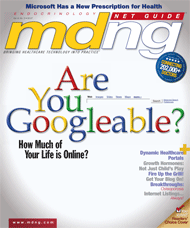Publication
Article
MDNG Endocrinology
Social Media Notebook: Blogs vs. Social Networks: Which Online Tools Will Physicians Flock To?
To blog or to social network, that is the question. With the growing popularity of online technologies like blogs, vlogs, and video sharing websites, physicians now have numerous ways to collaborate..
To blog or to social network, that is the question. With the growing popularity of online technologies like blogs, vlogs, and video sharing websites, physicians now have numerous ways to collaborate and share information. However, when it comes to uptake of these new tools, doctors have been voting with their feet (or more accurately, their browsers).
Nicholas Genes, MD, PhD, founder of the popular online event known as “Grand Rounds,” has been a major force
in medical blogging for many years. Grand Rounds brings together hundreds of physicians from around the world
who share and read superior healthcare-related posts each week. Despite the growing popularity of blogs in general, Dr. Genes has noted that physicians and other medical professionals have been slow to participate in significant numbers. On the other hand, social networks—online communities where doctors can quickly meet, network, and educate each other—have exploded in popularity.
Blogs: A Labor of Love
It is clear that certain physicians (especially those who enjoy writing) have embraced blogging. However, the time commitment required to maintain a blog may be a big turnoff for some. According to an Envision Solutions/Medical Blog Network survey of healthcare bloggers, 44% of physician respondents report that they spend between one and two hours working on their blog each day.
Why Social Networks Are Attracting More Eyeballs
Currently, it appears (at least according to anecdotal evidence) that healthcare providers itching for online interaction are turning to social networks. One key attraction is the level of community they provide. Although there is a communal aspect to blogging, it is largely a solitary activity. Social networks often require less time and effort to participate in and enable physicians to quickly post content and respond to others. Given this, social networks will likely continue to be more popular with the majority of physicians. One example of a successful physician social network is Sermo. Sermo is currently the nation’s largest online doctor community. Since its introduction in 2006, more than 10,000 physicians have signed up and spent thousands of hours each week discussing everything from diffi cult diagnoses and dealing with troublesome patients to handling sensitive staff issues and how to improve medical education.
Another social network that has attracted some attention is Healtheva. Launched in 2006, it is “a social networking platform for translational medicine that allows basic science researchers, clinical researchers, practicing physicians,
medical students, residents, and healthcare professionals to communicate and collaborate on an open platform.” The Healtheva website notes that members can “fi nd other doctors or researchers, keep track of colleagues met at conferences, and collaborate on projects with others. In addition, members can upload documents, evaluate and discuss issues in the forums, or start a blog.”
To blog or to social network, that is the question. With the growing popularity of online technologies like blogs, vlogs, and video sharing websites, physicians now have numerous ways to collaborate and share information. However, when it comes to uptake of these new tools, doctors have been voting with their feet (or more accurately, their browsers).
Don’t Count Blogs Out
Make no mistake, blogs are (and will remain) important for medical professionals and the healthcare industry in general. However, social networks are attracting more eyeballs because they take less time to participate in and foster broader and more diverse communities.
Grand Rounds
The latest host (at writing) was Med Valley High. Grand Rounds Archives and Upcoming Schedule Access archived editions of Grand Rounds (dating back to September 2004) and see which blogs are hosting upcoming editions.
Fard Johnmar is the founder of Envision Solutions, LLC, a full-service healthcare marketing communicationsconsulting firm.





